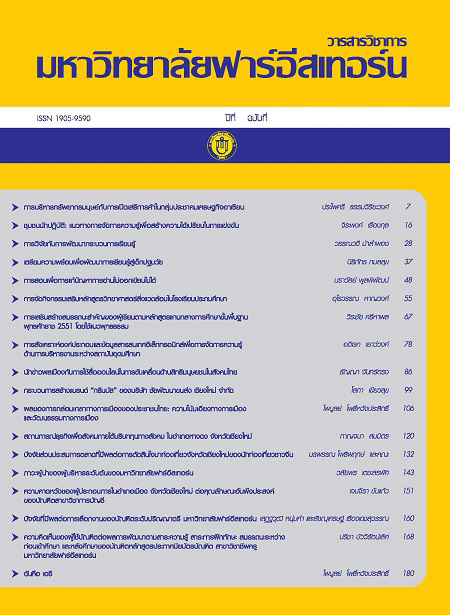กลุ่มผลประโยชน์ กลุ่มกดดัน และกระบวนการนโยบายสาธารณะ
Main Article Content
Abstract
กลุ่มผลประโยชน์และกลุ่มกดดันมีบทบาทสำคัญต่อการกำหนดและดำเนินนโยบายสาธารณะทั้งในต่างประเทศและในประเทศไทย ทฤษฎีกลุ่มผลประโยชน์เน้นกระบวนการต่อรองและการตัดสินใจของผู้นำกลุ่ม นอกจากนี้ การเปลี่ยนแปลงทางการเมืองและบทบาทของภาครัฐในการพัฒนาอุตสาหกรรมเป็นปัจจัยสำคัญที่กระตุ้นบทบาทของกลุ่มผลประโยชน์ในการกำหนดนโยบายสาธารณะ เนื้อหาในบทความนี้มีวัตถุประสงค์สองประการ ประการแรก คือ บทความนี้ต้องการสำรวจแนวคิดกลุ่มผลประโยชน์โดยเน้นทฤษฎีพหุนิยม (Pluralism) ชนชั้นนำนิยม (Elitism) และการแลกเปลี่ยน (Transaction Cost) ประการที่สอง คือ การตรวจสอบผลกระทบของกลุ่มผลประโยชน์ต่อกระบวนการการกำหนดและดำเนินนโยบายสาธารณะในประเทศไทย ผลการศึกษาชี้ให้เห็นว่าหากกลุ่มผลประโยชน์สามารถรวมตัวและลดความขัดแย้งภายในกลุ่มได้ กลุ่มผลประโยชน์ก็สามารถกดดันให้รัฐบาลให้การช่วยเหลือทางการเงินแก่ภาคธุรกิจของตนเพิ่มขึ้น
Interest and pressure groups have an influence on policy formation and policy implementation processes in foreign countries and in Thailand. Interest group theories are generally based on an analysis of group leaders’ negotiation and decision-making. Moreover, political transition and state role in industrial development are influential factors encouraging interest groups’ role in public policy formation. This article has two objectives. First objective was to review and examine theories of interest group focusing on Pluralist, Elite, and Transaction Cost theories. Second objective was to examine an effect of interest groups on policy formation and policy implementation processes in Thailand. Results show that if interest groups are able to coordinate and reduce internal conflict within their group, they are able to pressure government to increasingly provide financial assistance to their business sector.
Article Details
1. Any views and comments in the Journal of Social Innovation and Lifelong Learning are the authors’ views. The editorial staff have not to agree with those views and it is not considered as the editorial’s responsibility.
2. The responsibility of content and draft check of each article belongs to each author. In case, there is any lawsuit about copyright infringement. It is considered as the authors’ sole responsibility.
3. The article copyright belonging to the authors and The Far Eastern University are copyrighted legally. Republication must be received direct permission from the authors and The Far Eastern University in written form.

